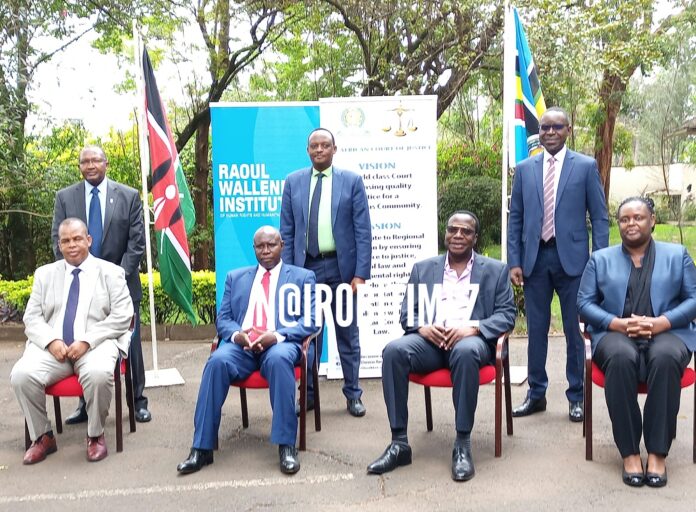BY SAM ALFAN.
The role of East Africa Court of Justicel is critical to the promotion of regional integration and good governance in Eastern Africa.
The court is critical for the resolution of potential disputes and challenges, which are bound to arise in the course of the implementation of the Treaty for the Establishment of the East African Community.
In a statement during the induction of new judges to the regional court, Acting Chief Justice Philomena Mwilu said the appointment of judges to the Judicial Organ of the EAC is a recognition of their knowledge, expertise, and experience in the applicable law.
New judges justices Yohane Masara, principal judge, Richard Muhumuza and Richard Wejuli. In the Appellate division the new judges are Kayobera who is the President of the court, Kathurima M’inoti and Anita Mugeni.
The statement was read by Supreme Court of Kenya Judge Smokin Wanjala who was representing the acting Chief Justice.
Justice Mwilu said the appointment comes during a very challenging time due to Covid-19 pandemic among other things.
“Once again, my heartfelt congratulations. Your appointment comes at a time of profound national, regional, and international turbulence, occasioned by the Covid-19 Pandemic, the re-ordering of trade relations triggered by BREXIT, the intensifying asymmetry in North-South relations, international terrorism and the never-ending threats to good governance, democracy and human rights in our region,” she said.
The Acting CJ added that the challenges will have a direct impact on the work of the Court, thus cementing your individual and collective destiny with history.
She said since inauguration in November 2001, the Court has heard and determined cases relating to the interpretation and application of the Treaty in accordance with Article 27.
“Indeed, a large majority of the Court’s initial decisions are meant to ensure the adherence to law in the interpretation and application of and compliance with the Treaty,” she said.
Mwilu said the Court’s efforts, the EAC now have a rich body of what can be categorized as the “East African Community Law”.
“It is for legal scholars to now continuously document and organize, the Court’s jurisprudence into authoritative texts for reference by students of law, as well as, judicial and other practitioners, in the legal fraternity.
Justice Mwilu said apart from its jurisdiction of interpreting the Treaty vis avis particular acts, legislation, directives and decisions of member states, the Court has power to issue Advisory opinion.
“In my view, this particular aspect of the Court’s jurisdiction is important for the resolution of practical and unique questions of law that may not have been contemplated by the Treaty makers. We at the Supreme Court of Kenya for example, have when properly moved, invoked our advisory opinion jurisdiction to resolve pertinent legal and constitutional questions that seemed unprovided for by the text, ” Mwilu added.
The induction workshop was meant to equip the judges with the information about the Treaty.
“At any rate, the facilitators of the workshop are highly experienced and knowledgeable judges of the Court, some retired while others are still in office,” she said.
Justice Mwilu added that given the fact that the Treaty and related Protocols are the basic tools of interpretation, it does no harm in constantly revisiting and interrogating their content and the presentation on the place of International Law.
She said the Court, should trigger interesting perspectives from the participants regarding this dynamic and ever evolving body of law.
“For those of you who may not have served as judicial officers at the national, regional or international level, the presentation on judgment writing in the Court should be very instructive and interesting,” she added.
The jurisdiction of the EAC Court is not limited to the interpretation of the Treaty and related Protocols.
Towards this end, Article 27 goes on to provide that “ the Court shall have such other original, appellate human rights and other jurisdiction as will be determined by the Council at a suitable date.”
She said a purposive interpretation of the Treaty in accordance with its foundational principles of democracy, rule of law, accountability, transparency, social justice, equal opportunity, gender equality, and as well as the recognition, promotion and protection of human rights, gives the Court considerable latitude as to how far it may go, beyond a mechanistic interpretation of the Treaty.
Speaking at the same event, East African Court of Justice registrar Francis Okubo said the court is facing financial challenges which requires to be addressed by member states urgently.
Okubo urged the EAC governments to allocate them with more funds to facilitate speedy hearing of cases.
“Common challenge is finance, we realise that in the country there are no funds and we get resources from our partner states and it is not sufficient to do our obligations,” Okubo said.







